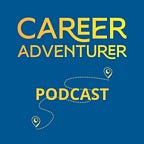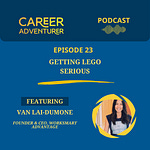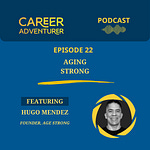How has pain fueled your career? Are you outsourcing your magic to AI? What exactly is “Seeking Sukha?”
On this episode of the Career Adventurer Podcast, former Hollywood executive and current startup founder, Steven Puri and Paul Fisher discuss these questions and more.
They dive deep into Steven’s story including his current focus with Sukha, a productivity startup designed to help people reclaim their time. Steven harnesses his experience as a Hollywood executive to create innovative solutions for remote work.
He shares insights on how pain and curiosity fuel meaningful pursuits and discusses how storytelling techniques enhance productivity far beyond the entertainment industry. The conversation covers AI's role in amplifying human potential, the importance of focusing on core tasks, and the enduring principles of effective work habits.
Plus, Steven shares a few choice behind-the-scenes stories, personal anecdotes, and practical wisdom learned from working on Hollywood blockbusters.
Listen to the full episode. You’re sure to pick up a nugget or three for your own career adventures.
Core Themes
Take note of these themes for your own career adventures.
Power of Pain
Pain is a motivator. Consumers seek products to alleviate their pain. Companies spend billions and billions of dollars guessing what causes pain. Whether we are a consumer looking for a way to alleviate a headache or a worker looking to make it through the day without ripping our hair out, we all want to minimize pain. Given that we spend roughly a third of our lives at work, we’ve got great incentive to minimize the acute distress with our day jobs.
Steven encourages us to take a page out of the Hollywood storytelling playbook in our careers. Ask ourselves what is our source of pain and how can we solve it.
“A lot of the things that I've done, including my current company, are a lot like when you're developing a film. You have to really understand your character and say, “Why is she or he in pain? What is the internal pain that they have? What is the external pain? What's the problem they think that they can solve in the world?” Then, how do we exploit that where they are put in the worst possible situation when they have to make a decision? Am I going to solve my pain or not?”
We All Make Soap
A decade ago, a good childhood friend invited me and my mom to a reading for an episode of The Family Guy. He was a writer for the show. We networked with other writers, producers, and actors while we waited for the reading to begin. I asked my friend what life as a writer is like on such a famous show. His response surprised me. He cooly said, “Meetings.” At that moment I realized that every adventure involves the mundane, no matter how cool the work sounds.
Steven provided a good reminder that even in “sexy” spaces like Hollywood, we all are just making soap. We all have to churn out the product. We all have to answer to committees. We all are part of “the machine.” The point: keep the right perspective even when doing cool work.
“Here's the thing that you don't see from the outside: It's soap. You are making soap after you've done it a while. You understand what Christmas soap smells like. You understand what July 4th soap smells like. It is a very regimented thing. You're not betting 50 bucks. You're betting $150 - $200 million a movie. It is a huge committee. It is a machine. It is sausage.”
The Problems are Timeless
It’s easy to believe that today’s novel technology solves new problems. We think there are new challenges or human jobs-to-be-done. The reality is most problems we face as humans are just new variations of the same issues we’ve always faced. How do I provide for my family? How do I make time for the one’s I love? How do I find meaning in life?
Steven saw thousands of stories in Hollywood. Yet, he observed most movies repackage the same story. The guy wants to win the girl. Or, the dad wants to protect his family. Or, the mom wants to have greater purpose. Further, he claims that many personal growth books tout the same principles in different ways.
“Read “Flow” by Mihaly Csikszentmihalyi. Read James Clear. When you read Cal Newport’s, “Deep Work.” All these smart people have written about this. I'll be super blunt. Once you read those 12 books back-to-back, you realize the principles are basically the same. They use different lexicon to sell you their book. It's the same kind of ideas: flow states, focus, mono-tasking, block distractions, use music, organize.”
Don’t Outsource Your Magic
There’s a lot of talk about how AI could make us dumber. I hosted a panel of “experts” to discuss the Future of Work in an AI world recently. One thing that seems to be clear is that AI is here to stay, and we as humans need to figure out how to use it without giving up our humanity.
Steven talked about how his current company is focused on using AI to help you lean further into your strengths. It would behoove all of us to know the things we should and should not outsource to our helpers, tech or otherwise.
“If you were to go to Usain Bolt and say, “Hey man, we developed this AI robot that can run faster than you, so hey, you wanna just hang out? Let the robot run all good.” It would suck for Usain, it would suck for everyone in the stands watching, right? But if you were to say to him, “Hey man, we used AI to get this shoe to fit your toes just a little bit better. You might shave half a second off your a hundred.” That's super interesting ‘cause what it is it's about let me help you over perform.”
Work On Meaningful Things
“Duh,” you might say. “Of course I want to work on meaningful things.” Yet, that isn’t what the survey data says we care about. According to a 2022 Gallup study, the most important factor for a job is income. This isn’t “wrong” by any means. "(I’ve made career decisions based on the almighty buck a few times.) Yet, I would contend that if you want to have meaningful career adventures that give you purpose and you are already “well off”, consider asking yourself what will REALLY make you tic.
Steven shared how working on Mel Gibson’s Braveheart was a pinnacle moment of his career. He also said that it really doesn’t have many connections to what he does today as a startup founder. Yet, it was meaningful, important, and worthwhile, nonetheless.
“It was a movie that was about something. Super proud of it. I still watch it and appreciate it. The lessons on that movie were not necessarily applicable to what I do now, but man, you were working on that and you felt like I'm working on something that's actually meaningful and that's really nice.”
Hear More About Steven’s Meaningful Path
We had an energetic, thoughtful conversation about life, career, film, AI, and more.
Steven talked about more than these themes. He talked about getting personal messages from Hugh Jackman. He talked about how he decided to name his company Sukha. He talked about seeking happiness through pain and curiosity.
Go beyond these themes. Listen to the full episode.
Enjoy the episode! Thanks for you support!
Paul G. Fisher














